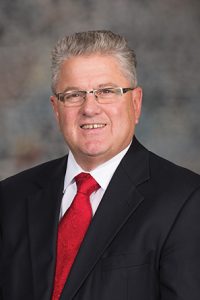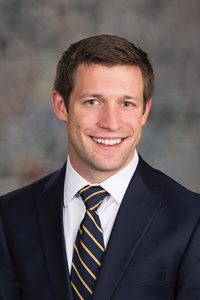Bills would strengthen pharmacy benefit manager regulation
The Banking, Commerce and Insurance Committee heard joint testimony March 2 on two bills that would regulate pharmacy benefit managers in Nebraska.

LB375, sponsored by Sen. Mark Kolterman of Seward, would codify several changes effecting pharmacy benefit managers — companies that manage prescription drug benefits on behalf of health insurers — including requiring PBMs to obtain a certificate of authority from the state Department of Insurance for a fee not to exceed $5,000.
Under the bill, PBMs would be prohibited from charging or collecting a copayment for a prescription or pharmacy service that exceeds the amount retained by the network pharmacy from all payment sources for filling a prescription or providing a service.
A PBM could not exclude a Nebraska pharmacy from its specialty pharmacy network and the department would have authority to examine a PBM’s financial condition and revoke or suspend a certificate. Violations of the bill would be considered violations of the Unfair Insurance Trade Practices Act.
Kolterman said PBMs need more oversight because their business practices are causing local pharmacies to lose money.
“These pharmacists out there, they’re just trying to make a living and we have to help them survive,” Kolterman said. “For 85 years my family owned a business in Seward, Nebraska. It was a Ben Franklin store … they aren’t around anymore. You know why? Walmart put them out of business.”
LB270, sponsored by Lincoln Sen. Adam Morfeld, would prohibit PBMs from excluding pharmacies from their networks, prohibit charging higher copays at local pharmacies and prohibit steering patients to mail order pharmacies.

“Over time, PBMs have taken advantage of their strategic position between the insurer and provider to assert control over prices, and most aspects of prescription drug [transactions],” Morfeld said.
Dr. Marcia Mueting, CEO of the Nebraska Pharmacists Association, testified in support of both bills. She said the role of PBMs has expanded beyond their original intent and they have increased the cost of prescription medication.
“PBMs collect rebates from drug manufacturers, they conduct predatory audits — which have become a profit center — reimburse pharmacies at below-cost rates and offer contracts to pharmacies that are not negotiable,” Mueting said.
Pat Spanel spoke in support of LB375. Spanel said she takes seven prescription medications and recently a PBM changed the brand of medication for all of her prescriptions.
“A 90-day supply [of medication], wasted. My co-pay money, wasted,” Spanel said.
Dr. Marcus Snow, testifying on behalf of the Nebraska Medical Association, the Nebraska Rheumatology Society and the American College of Rheumatology, also testified in support of both bills. He said PBMs can force a patient to change medication against a doctor’s advice.
“I have a patient who has responded, who’s doing well, and [the PBM] is asking me to move them to a different medication and putting their health at risk,” Snow said.
Coleen Nielsen, speaking on behalf of PBM Prime Therapeutics, testified in opposition to both bills, saying they “take aim” at the way PBMs help consumers and that restricting audit programs would lead to more waste, fraud and abuse.
“The purpose of PBMs is to ensure that patients have access to affordable prescription drugs by encouraging them and their physicians to select the safest and the most effective drugs at the lowest possible price,” Nielsen said.
Jay McLaren, testifying on behalf of health insurer Medica, also spoke in opposition to both proposals. McLaren expressed sympathy for patients caught in the middle of a disagreement between a PBM and a pharmacist but said the specialty pharmacy Medica uses provides vital medical expertise and increases competition, which reduces drug costs.
The committee took no immediate action on either bill.


